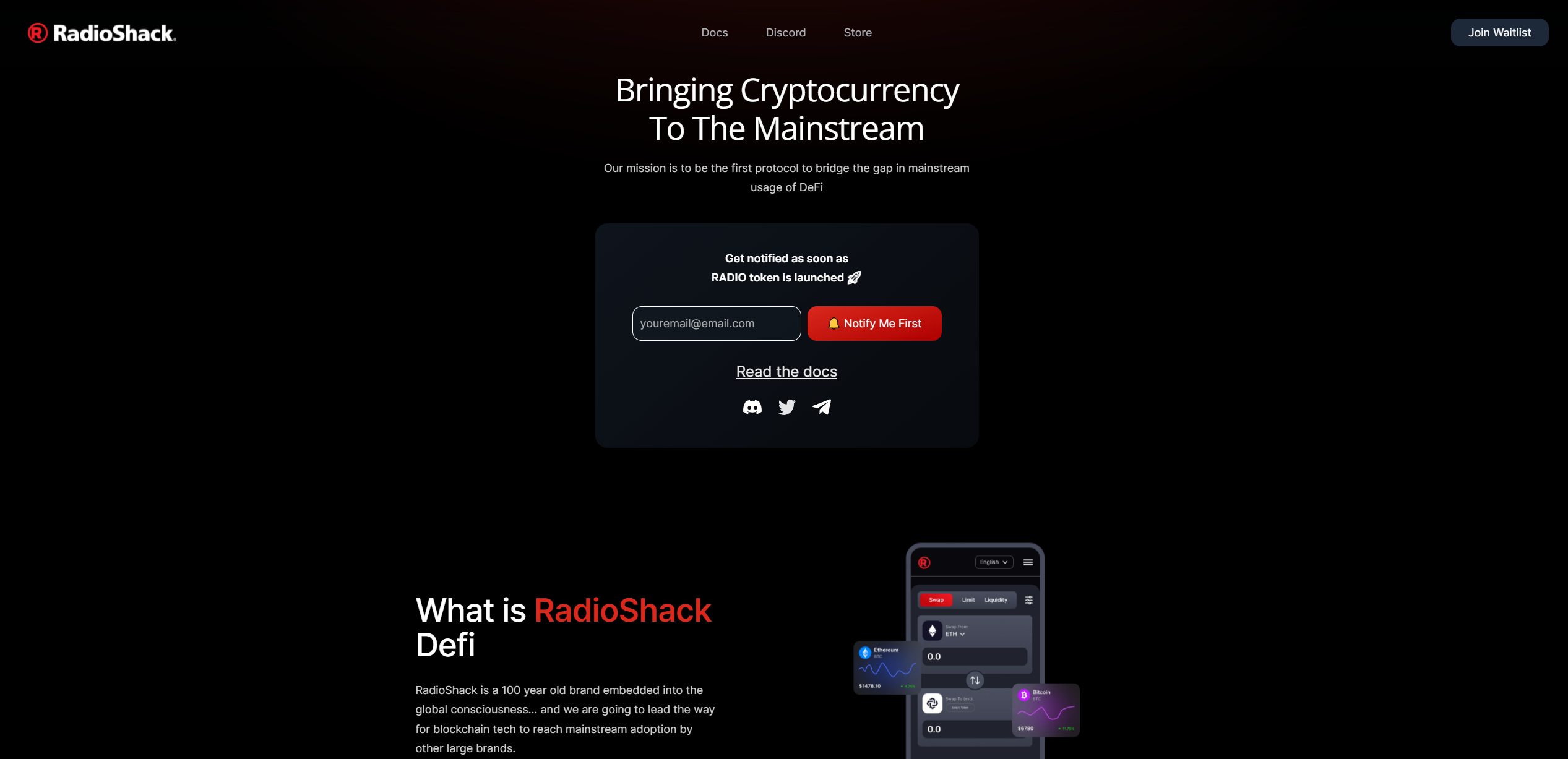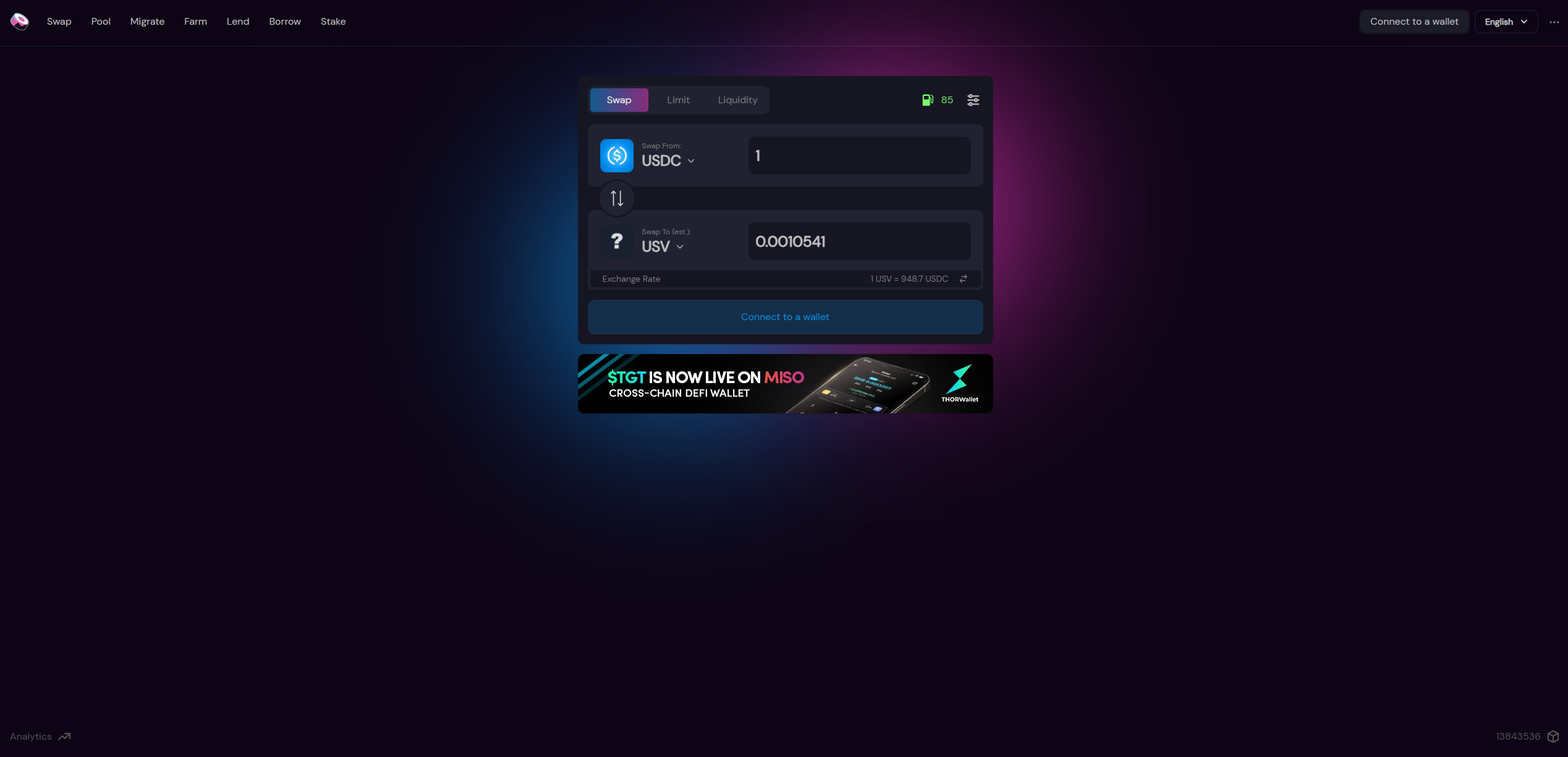RadioShack Turns to Crypto With RADIO Tokens
Company hopes its retail presence will help it build a DeFi empire.
RadioShack, which you might best remember for carrying all manner of trending electronics goods since its founding in 1921, is restructuring. The company has decided that its steps toward ecommerce weren't enough; it now wants to turn to blockchain technology. Specifically, it wants to become a Decentralized Finance (DeFi) provider. And it's positioning itself as the only entity that can "...be the bridge between the CEO's [sic] who control the world's corporations and the new world of cryptocurrencies." To help that ...interesting string of words move toward reality, the company plans to launch its own token: RADIO.
To be clear, the RadioShack of today isn't the one you remember from years past. It has transitioned from being a brick-and-mortar store toward ecommerce. And the transition was all but swift. RadioShack filed for Chapter Eleven bankruptcy in 2015 after 11 (yes, eleven) consecutive financial quarters in the red. Afterward, the brand was sold multiple times until it was finally acquired by holding company Retail Ecommerce Ventures (REV), owned by Tai Lopez and Alex Mehr (these names will be relevant in a bit). REV still holds the RadioShack brand - and they're betting on its mainstream recognition and storied past as a way to "bridge the gap and 'cross the chasm' of mainstream usage for Cryptocurrency."

The goal is to make RadioShack a leader among the companies riding the cryptocurrency market value from its current $3 trillion towards its estimated $250 trillion potential. RadioShack's executives plan on doing this by focusing "on the early majority. [RadioShack DeFi] will become the first to market with a 100 year old brand name that’s recognized in virtually all 190+ countries in the world." Because that's what cutting-edge currency tech is lacking: a brand name that peaked in the 1900s, and then collapsed.
RadioShack is building its DeFi ecosystem in partnership with Atlas USV (Universal Store of Value), a DeFi protocol that allows Decentralized Applications (dAPPS) to be built atop it. RadioShack then plans to launch a decentralized exchange (DEX) in the vein of Uniswap or Sushiswap. This "allows USV users to purchase third-party tokens in the open market and then transfer them to the Atlas USV treasury in return for discounted USV tokens."
Interestingly, Atlas USV is a small company (and a small protocol) in the crypto space. It still hasn't picked up by CoinGecko or CoinMarketCap, which track more than 10,000 different crypto assets in circulation around the globe. But its token, USV, can already be traded on DEXs. It's available on both the Ethereum and Solana chains, and each unit of USV is currently valued at an eyebrow-raising $948. If you're wondering who set up Atlas USV, this is where you should test your name recall capabilities: It's the brainchild of Tai Lopez and Alex Mehr.


Essentially, RadioShack is setting itself up to receive tokens that already have established market value. Options such as Bitcoin, Ethereum, Solana, and Atlas USV's own USV token could all then be staked, setting them up as liquidity pools. Users who stake these coins (meaning that they commit them to the liquidity pools and lock them in a smart contract that prevents them from being moved) will then receive RadioShack's own token, RADIO, in exchange. It's a tried and true way of launching a DEX, as Uniswap proved. Stakers become investors, and they immediately add to RadioShack's coffers by leaving their valuable crypto in their trust. It's also a tried and true strategy for rug-pulls, however, particularly in the DeFi space. This is the crypto space we're talking about, after all. The good coexists with the bad.
RadioShack is far from its peak number of retail locations. Before things crumbled, starting at around 2003, the company counted as many as 8,000 retail locations in the USA alone, and had a presence in South America and the Middle East. Its current 500 retail locations are an interesting element to the technology pivot; it makes sense that the company would make use of all that floor space to actually bring cryptocurrencies out of their abstract, digital presentation.
Get Tom's Hardware's best news and in-depth reviews, straight to your inbox.
Considering the interest displayed by RadioShack in entering the blockchain space, it seems like a distinct possibility that the company might explore Non-Fungible Tokens (NFTs) next. Perhaps the retail locations could be useful here as well: RadioShack could envision running them as social spaces, for acquisition and trading of these NFTs. Perhaps RadioShack will even sell digital versions of its historic brick-and-mortar stores in a digital plot of land?
RadioShack would do well to thread lightly, though, irrespective of how deep a dive it takes onto cryptocurrencies. The crypto space is still fraught by high-profile thefts and scams (which snagged a collective $7.7 billion from their legit owners in 2020 already). Brands can die if they make the wrong bets, no matter how historically "tried and true" they feel to be. And while a brand like RadioShack certainly has more name recognition than most others in crypto world, it's still clearly on shaky ground and playing in a complicated, fast-moving space.

Francisco Pires is a freelance news writer for Tom's Hardware with a soft side for quantum computing.
-
Endymio ReplyRadio Shack's 500 retail locations are an interesting element... it makes sense that the company would make use of all that floor space to actually bring cryptocurrencies out of their abstract, digital presentation.
Can anyone think of anything less useful to an abstract digital currency than brick-and-mortar floor space? -
BrandonWilke RadioShack discord https://discord.gg/9nxt4DxFReply
Atlas USV discord https://discord.gg/ybSaB9WK